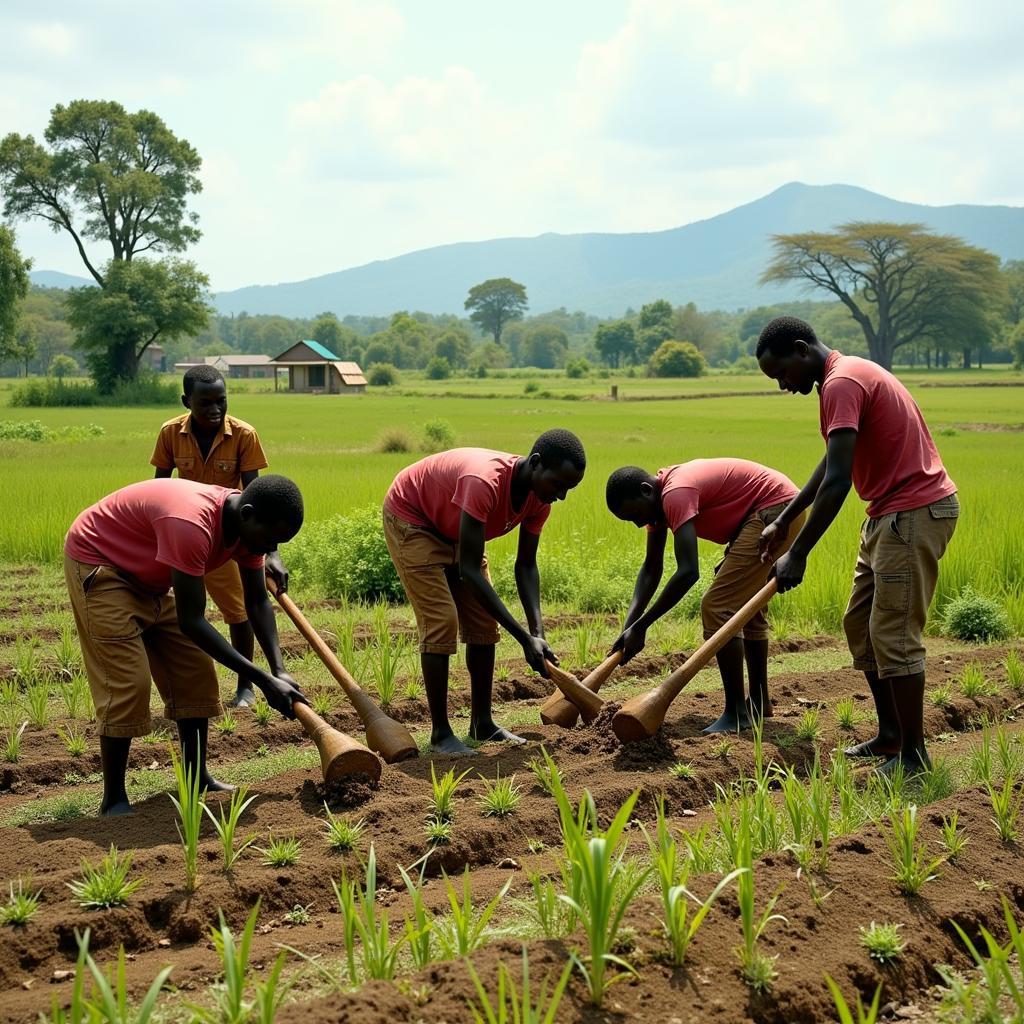Adaption of African Agriculture
African agriculture is facing unprecedented challenges in the 21st century. Climate change, population growth, and economic instability are just a few of the factors pushing the sector to adapt and evolve. The Adaption Of African Agriculture is not just a matter of survival, it’s a necessity for growth and prosperity across the continent.
The Urgent Need for Adaption in African Agriculture
African agriculture is predominantly rain-fed, making it highly vulnerable to the impacts of climate change. Erratic rainfall patterns, prolonged droughts, and increased frequency of extreme weather events are already impacting crop yields and livestock production. This necessitates urgent action and innovative solutions to ensure food security and economic stability for millions of Africans whose livelihoods depend on agriculture. Adaption strategies must consider the diverse agro-ecological zones and socio-economic contexts across the continent.
Innovative Technologies for Adaption of African Agriculture
Technology offers a powerful tool for agricultural adaption. Precision agriculture techniques, using GPS, sensors, and data analytics, can optimize resource use and improve yields. Drought-resistant crop varieties, developed through biotechnology, offer a promising solution to water scarcity. Mobile technology plays a crucial role in disseminating information, connecting farmers to markets, and providing access to financial services. The adoption of these technologies, while challenging, holds the key to transforming African agriculture into a more resilient and productive sector.
“Technology is not a silver bullet, but it’s a crucial component of a holistic approach to agricultural adaption,” says Dr. Anika Olajide, an agricultural economist based in Nairobi. “It’s about empowering farmers with the tools and knowledge they need to thrive in a changing climate.”
Traditional Knowledge and Adaption of African Agriculture
While embracing new technologies is essential, it’s equally important to recognize the value of traditional farming practices. Indigenous knowledge systems, developed over generations, contain valuable insights into sustainable land management, water conservation, and pest control. Integrating these time-tested methods with modern scientific approaches can lead to more effective and culturally appropriate adaption strategies.
 African Farmers Using Traditional Farming Methods
African Farmers Using Traditional Farming Methods
Building Resilience Through Diversification
Diversifying crops and livestock production can significantly enhance resilience to climate change. By moving away from monoculture systems and embracing agroforestry and integrated farming practices, farmers can reduce their vulnerability to pests, diseases, and market fluctuations. Diversification also contributes to improved soil health, biodiversity conservation, and enhanced nutritional security for rural communities.
“Diversification is not just about growing different crops,” explains Chief Malik Suleiman, a traditional farmer from Tanzania. “It’s about building a more resilient and sustainable ecosystem that can support our communities for generations to come.”
Investing in Adaption: The Future of African Agriculture
Adapting African agriculture to the challenges of the 21st century requires significant investment in research, infrastructure, and capacity building. Governments, international organizations, and the private sector must work together to create an enabling environment for innovation and sustainable agricultural development. Investing in adaption is not just a cost, it’s an investment in the future of Africa.
What are the main challenges facing African agriculture?
Climate change, population growth, land degradation, and limited access to markets and finance are among the major challenges.
How can technology contribute to agricultural adaption in Africa?
Technologies like precision agriculture, drought-resistant crops, and mobile technology can optimize resource use, improve yields, and connect farmers to vital information and services.
What is the role of traditional knowledge in adapting African agriculture?
Traditional farming practices offer valuable insights into sustainable land management, water conservation, and pest control that can be integrated with modern scientific approaches.
Why is diversification important for agricultural resilience?
Diversifying crops and livestock reduces vulnerability to pests, diseases, market fluctuations, and enhances overall ecosystem health and nutritional security.
Who needs to be involved in investing in the adaption of African agriculture?
Governments, international organizations, the private sector, and research institutions all need to collaborate to create an enabling environment for innovation and sustainable agricultural development.
What are some examples of successful adaption strategies in African agriculture?
Examples include the adoption of drought-resistant crops, the use of climate-smart agricultural practices, and the development of community-based irrigation systems.
What is the importance of investing in the adaption of African agriculture?
Investing in adaption ensures food security, supports livelihoods, promotes economic growth, and builds a more sustainable future for the continent.
Adaption of African agriculture is crucial for the continent’s future. By embracing innovation, investing in research and development, and empowering farmers with the tools and knowledge they need, we can build a more resilient and prosperous agricultural sector that can feed a growing population and contribute to sustainable development.
For further assistance and information regarding adapting African agriculture, please contact us at +255768904061, email us at kaka.mag@gmail.com, or visit us at Mbarali DC Mawindi, Kangaga, Tanzania. We have a 24/7 customer support team ready to assist you.



